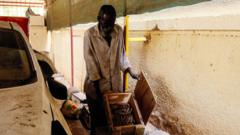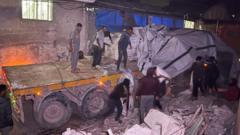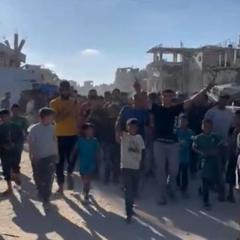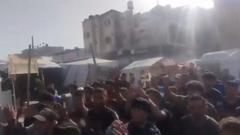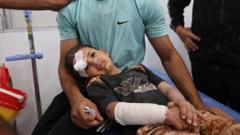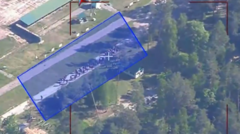As a narrow window of food aid trickles into Gaza, chaotic scenes unfold as residents grapple with hunger amid increasing violence and insecurity in the region.
Chaos Erupts in Gaza as Food Aid Runs Low
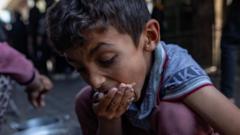
Chaos Erupts in Gaza as Food Aid Runs Low
Desperation mounts in Gaza as aid deliveries are met with violence and chaos, exacerbating the humanitarian crisis.
The recent easing of an Israeli blockade has allowed for limited food supplies to enter Gaza, yet the situation is spiraling out of control. Limited aid has resulted in desperate crowds overwhelming bakeries, forcing some to shut their doors for safety. Tensions escalated further when armed looters attacked a food convoy escorted by Hamas security, leading to clashes that ended with an Israeli drone strike on the militants, claiming several lives.
This incident highlights a deteriorating security landscape in Gaza, where lawlessness reigns as civil order collapses. According to observers, only a mere fraction of the humanitarian aid—about 130 trucks—has crossed the border in the last several days, due to ongoing challenges posed by the blockade. The Arab nations and aid organizations have repeatedly underscored the dire need for food and medical supplies, stating that the influx of 500 to 600 trucks per day is necessary to meet the urgent requirements of the 2.1 million residents.
Witnesses have described the mounting anger among locals, trapped in a constant cycle of shortages. Many families are pleading for a change in aid distribution methods, suggesting that flour be handed out directly instead of pre-baked bread to allow for safer preparations at home. UN officials have echoed these sentiments, emphasizing that the limited entry of supplies is grossly inadequate, resulting in widespread malnutrition and suffering among the population.
Reports from displaced families in overcrowded camps portray a grim reality: lack of electricity, food, and clean water. The UN Secretary General has stated that while some aid has started to trickle in, it is nowhere near sufficient. The situation is exacerbated by ongoing airstrikes that compound the suffering of civilians, with mothers struggling to provide for their children amidst widespread deprivation.
As the humanitarian disaster deepens, local residents, aid workers, and international officials continue to call for more substantial and immediate assistance to avert a looming famine, fearing that without swift intervention, the crisis will escalate further.



